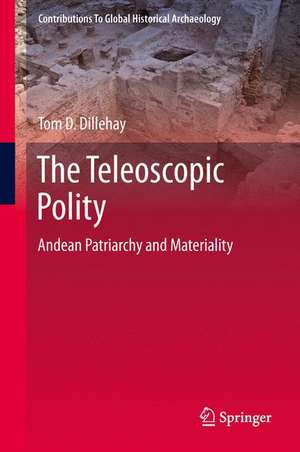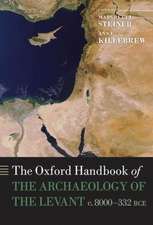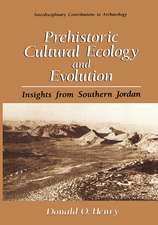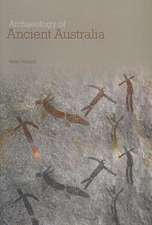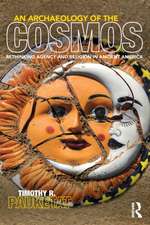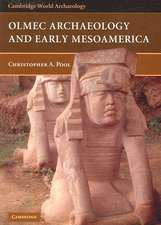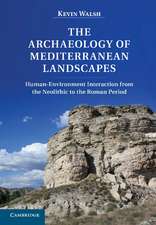The Teleoscopic Polity: Andean Patriarchy and Materiality: Contributions To Global Historical Archaeology, cartea 38
Autor Tom D. Dillehayen Limba Engleză Hardback – 14 feb 2014
Throughout its treatment, the volume continually comes back to two central questions: (1) how did the varied practices, institutions and worldviews of the Mapuche’s ancient communities emerge as a historical process that resisted the Spanish empire for more than 250 years? and (2) how were these communities reproduced and transformed in the face of ongoing culture contact and landscape change during the early Colonial period? These questions are considered in light of contemporary theoretical concepts regarding practice, landscape, environment, social organization, materiality and community that will make the book relevant for students and scholars interested in similar processes elsewhere.
| Toate formatele și edițiile | Preț | Express |
|---|---|---|
| Paperback (1) | 395.09 lei 43-57 zile | |
| Springer International Publishing – 17 sep 2016 | 395.09 lei 43-57 zile | |
| Hardback (1) | 401.24 lei 43-57 zile | |
| Springer International Publishing – 14 feb 2014 | 401.24 lei 43-57 zile |
Din seria Contributions To Global Historical Archaeology
- 15%
 Preț: 640.24 lei
Preț: 640.24 lei - 15%
 Preț: 642.36 lei
Preț: 642.36 lei - 15%
 Preț: 643.84 lei
Preț: 643.84 lei -
 Preț: 399.12 lei
Preț: 399.12 lei - 15%
 Preț: 639.90 lei
Preț: 639.90 lei - 15%
 Preț: 644.82 lei
Preț: 644.82 lei - 15%
 Preț: 636.80 lei
Preț: 636.80 lei - 15%
 Preț: 643.84 lei
Preț: 643.84 lei - 18%
 Preț: 949.23 lei
Preț: 949.23 lei - 15%
 Preț: 640.24 lei
Preț: 640.24 lei - 15%
 Preț: 640.06 lei
Preț: 640.06 lei - 15%
 Preț: 641.71 lei
Preț: 641.71 lei - 15%
 Preț: 646.75 lei
Preț: 646.75 lei - 15%
 Preț: 642.03 lei
Preț: 642.03 lei -
 Preț: 390.46 lei
Preț: 390.46 lei -
 Preț: 391.79 lei
Preț: 391.79 lei - 15%
 Preț: 642.51 lei
Preț: 642.51 lei - 15%
 Preț: 647.73 lei
Preț: 647.73 lei -
 Preț: 383.71 lei
Preț: 383.71 lei -
 Preț: 387.96 lei
Preț: 387.96 lei - 15%
 Preț: 643.99 lei
Preț: 643.99 lei - 18%
 Preț: 968.65 lei
Preț: 968.65 lei - 15%
 Preț: 639.08 lei
Preț: 639.08 lei - 15%
 Preț: 636.63 lei
Preț: 636.63 lei - 18%
 Preț: 954.93 lei
Preț: 954.93 lei -
 Preț: 384.86 lei
Preț: 384.86 lei - 15%
 Preț: 641.85 lei
Preț: 641.85 lei - 15%
 Preț: 641.53 lei
Preț: 641.53 lei - 15%
 Preț: 643.99 lei
Preț: 643.99 lei - 15%
 Preț: 645.28 lei
Preț: 645.28 lei - 18%
 Preț: 733.46 lei
Preț: 733.46 lei
Preț: 401.24 lei
Nou
Puncte Express: 602
Preț estimativ în valută:
76.78€ • 80.36$ • 63.90£
76.78€ • 80.36$ • 63.90£
Carte tipărită la comandă
Livrare economică 31 martie-14 aprilie
Preluare comenzi: 021 569.72.76
Specificații
ISBN-13: 9783319031279
ISBN-10: 3319031279
Pagini: 200
Ilustrații: XXVII, 388 p. 102 illus., 60 illus. in color.
Dimensiuni: 155 x 235 x 30 mm
Greutate: 0.73 kg
Ediția:2014
Editura: Springer International Publishing
Colecția Springer
Seria Contributions To Global Historical Archaeology
Locul publicării:Cham, Switzerland
ISBN-10: 3319031279
Pagini: 200
Ilustrații: XXVII, 388 p. 102 illus., 60 illus. in color.
Dimensiuni: 155 x 235 x 30 mm
Greutate: 0.73 kg
Ediția:2014
Editura: Springer International Publishing
Colecția Springer
Seria Contributions To Global Historical Archaeology
Locul publicării:Cham, Switzerland
Public țintă
ResearchCuprins
Chapter 1: Introduction.- Chapter 2: The Estado as a Proto-State Polity.- Chapter 3: The Spanish-Mapuche World of the Purén and Lumaco Valley in the 16th and 17th Centuries.- Chapter 4: Data, Methods and Background.- Chapter 5: Archaeological Material Manifestations.- Chapter 6: Environmental Responses to Climatic and Cultural Changes over the last 26,000 years.- Chapter 7: The Archaeological Record.- Chapter 8: Archaeobotanical Remains.- Chapter 9: Ceramics and Other Artifacts.- Chapter 10: Site Distribution and Settlement Pattern.- Chapter 11: The Kuel and Ceremonial Fields as Places of Patriotism and Patriarchy.
Notă biografică
Tom Dillehay, Rebecca Webb Wilson University Distinguished Professor of Anthropology, Religion and Cultureand Professor of Anthropology and Latin American Studies at Vanderbilt University, and Professor Extraordinaire and Honorary Doctorate at the Universidad Austral de Chile. He has been a Visiting Professor at several universities around the world, including the Universidad de Chile, Universidad Nacional Mayor de San Marcos, Lima, Universidade de Sao Paulo, Universidad Nacional Autonoma de Mexico, Cambridge University, University of Tokyo, University of Chicago, among others. Professor Dillehay has published twenty-two books and more than two hundred refereed journal articles and book chapters. He is a leading South American archaeologist recognized for his groundbreaking and highly interdisciplinary research and has served as a consultant to several governments and academic institutions in Chile, Peru, Colombia, Argentina, Uruguay and Mexico. He is a member of the American Academy of Arts and Sciences.
Textul de pe ultima copertă
This volume provides an up-to-date and in-depth summary and analysis of the political practices of pre-Columbian communities of the Araucanians or Mapuche of southcentral Chile and adjacent regions. This synthesis draws upon the empirical record documented in original research, as well as a critical examination of previous studies. By applying both archaeological and ethnohistorical approaches, the latter including ethnography, this volume distinguishes itself from many other studies that explore South American archaeology. Archaeological and traditional-historical narratives of the pre-European past are considered in their own terms and for the extent to which they can be integrated in order to provide a more rounded and realistic understanding than otherwise of the origins and courses of ecological, economic, social and political
changes in the south-central Andes from late pre-Hispanic times, through the contact period and up to Chile’s independence from Spain (ca. AD 1450-1810). Both the approach and the results are discussed in the light of similar situations elsewhere.
Throughout its treatment, the volume continually comes back to two central questions: (1) how did the varied practices, institutions, and worldviews of the Mapuche’s ancient
communities emerge as a historical process that resisted the Spanish empire for more than 250 years, and (2) how were these communities reproduced and transformed in the face of ongoing culture contact and landscape change during the early Colonial period? These questions are considered in light of contemporary theoretical concepts regarding practice, landscape, environment, social organization, materiality, community, and what the author refers to as a teleoscopic political formation that will make the book relevant for students and scholars interested in similar processes elsewhere.
changes in the south-central Andes from late pre-Hispanic times, through the contact period and up to Chile’s independence from Spain (ca. AD 1450-1810). Both the approach and the results are discussed in the light of similar situations elsewhere.
Throughout its treatment, the volume continually comes back to two central questions: (1) how did the varied practices, institutions, and worldviews of the Mapuche’s ancient
communities emerge as a historical process that resisted the Spanish empire for more than 250 years, and (2) how were these communities reproduced and transformed in the face of ongoing culture contact and landscape change during the early Colonial period? These questions are considered in light of contemporary theoretical concepts regarding practice, landscape, environment, social organization, materiality, community, and what the author refers to as a teleoscopic political formation that will make the book relevant for students and scholars interested in similar processes elsewhere.
Caracteristici
Breaks new ground as one of the first treatments of the south-central Andes and colonization Uses both archaeological and ethnohistorical approaches for its analysis Contains three appendices covering paleoecology, subsistence remains and ethnohistorical documents Includes supplementary material: sn.pub/extras
